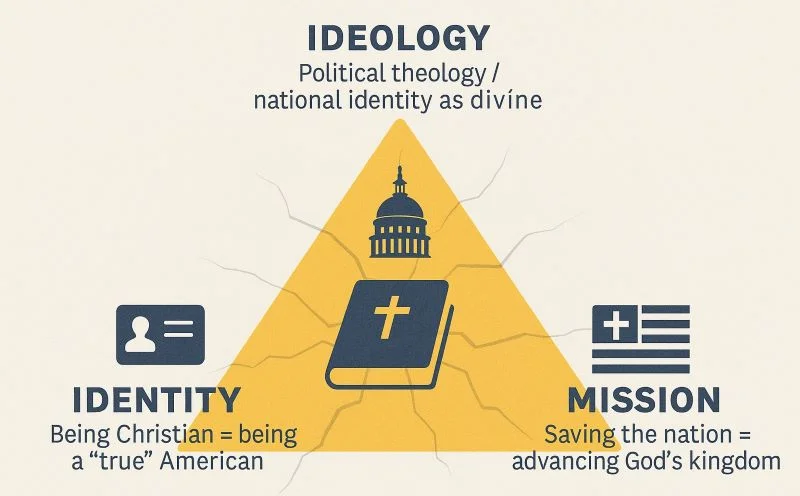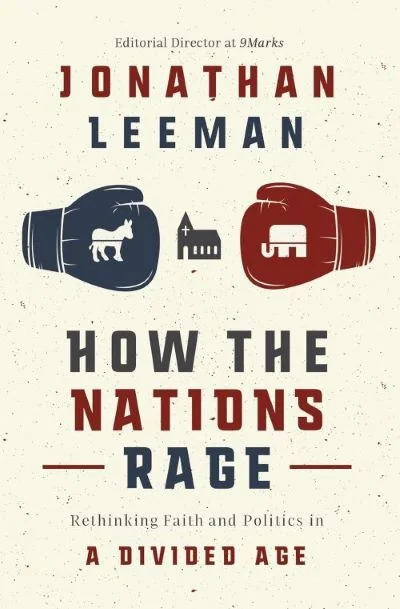
Imagine walking into your kid’s classroom and finding the State Superintendent’s prayer for the president playing on screen, under the banner of patriotism. That actually happened in Oklahoma.
In April 2024, classrooms across Oklahoma received a surprising directive from the state’s top education official. Superintendent Ryan Walters released a video of himself praying for Donald Trump by name, and urged public schools to show it to students under the banner of “religious freedom and patriotism.”
What unfolded wasn’t just a moment of prayer—it was a national flashpoint. Critics, parents, and legal experts called foul, claiming the video blurred the constitutional line between church and state. Others saw it as a righteous stand for faith in public life. But for many Christians, this event raised a deeper concern:
Has our loyalty to Christ been hijacked by political fervor?
At what point does love for country become a spiritual compromise?
Christian nationalism isn’t just a fringe movement anymore. It’s showing up in classrooms, pulpits, and rallies—often dressed in Scripture and wrapped in the flag. But Biblical Christianity calls us to something far higher: citizenship in the Kingdom of God, not allegiance to a political agenda.
In this post, we’ll explore the growing confusion between genuine faith and national identity, why conflating the two is spiritually dangerous, and how the gospel offers a better way forward—one rooted in truth, not tribalism.
Defining Christian Nationalism vs. Biblical Christianity

Christian nationalism is a belief system that conflates religious and national identities, suggesting that one nation (typically the United States) is uniquely chosen and blessed by God. It often implies that to be a “true” Christian is to be patriotic, and to be patriotic is to embrace a particular national ideology.
Biblical Christianity, however, transcends national borders. It calls believers to be citizens of heaven (Philippians 3:20), ambassadors of Christ (2 Corinthians 5:20), and pilgrims on earth (1 Peter 2:11). The gospel is not confined to any one culture or country.
This distinction matters now more than ever. As faith becomes entangled with political ideology, it risks becoming a tool for exclusion rather than a message of reconciliation. Biblical Christianity emphasizes transformation through Christ, not dominance through legislation.
The Historical Tapestry: Roots of Christian Nationalism
Christian nationalism is deeply rooted in American history. The Puritans viewed themselves as establishing a “city on a hill”—a new Israel ordained by God. This blend of national destiny and divine mission has lingered ever since.
In the Cold War era, the fight against “godless communism” reinvigorated the idea that America held a special place in God’s plan. Phrases like “In God We Trust” and “One Nation Under God” were institutionalized.
More recently, movements like dominionism (which advocates for Christian influence over all spheres of society) and theonomy (which seeks to implement Old Testament laws) have pushed for a closer merger between church and state. These ideologies have often intersected with racial and cultural superiority narratives.
Understanding these historical roots helps us critically evaluate the modern expression of Christian nationalism and its deviation from the gospel.
The Triadic Nature of Christian Nationalism

Christian nationalism wears three faces:
1️⃣ The Good
Some proponents simply want Christian values to influence public life. They support prayer in schools, religious liberty, and moral laws that align with biblical principles. These efforts can have a positive cultural impact when pursued through persuasion rather than compulsion.
2️⃣ The Bad
Problems arise when Christianity is co-opted for political ends. Faith becomes a badge of national identity, and dissenting voices—including other Christians—are marginalized. This often results in a shallow public religion that has more to do with cultural conformity than spiritual conviction.
3️⃣ The Ugly
The most dangerous form of Christian nationalism seeks power and dominance. It fosters an “us vs. them” mentality, dehumanizes opponents, and justifies coercive tactics. At this point, the Gospel is no longer about love and redemption but about control and supremacy.
The Biblical Perspective: An Exilic Identity in a Promised Kingdom
Scripture reminds believers that their ultimate citizenship is in heaven (Philippians 3:20). The Bible calls Christians to live as exiles and strangers (1 Peter 2:11), not as national loyalists first and foremost.
Jesus did not align Himself with any political movement. Instead, He proclaimed a Kingdom not of this world (John 18:36). His followers are called to model this same posture: influencing the world not by force, but through love, truth, and sacrificial service.
Transformation begins in the heart. While laws can restrain evil, only the gospel can change hearts. This is why efforts to legislate morality without gospel-rooted transformation often fail—they deal with symptoms, not the source.
Patriotism vs. Nationalism: Navigating Love and Identity
Patriotism can be good. It’s a love for one’s country that expresses gratitude and seeks its flourishing. It acknowledges faults and works toward justice.
Nationalism, however, places one’s country above others and God. It makes national identity the lens through which everything—even Scripture—is interpreted. This shift from gratitude to supremacy marks the point where patriotism becomes idolatry.
Christians must ask: Is our national pride rooted in truth and love? Or is it veering into territory where we’re defending a kingdom of this world instead of advancing the Kingdom of God?
Practical Implications: Living the Faith Beyond Nationalism

How should Christians respond?
- ✅ Engage politically with discernment: Vote and advocate for justice, but never at the expense of your witness.
- ✅ Practice gospel-centered citizenship: Let your allegiance to Christ shape your civic engagement, not the other way around.
- ✅ Pursue peace and pluralism: Respect the religious freedom of others. A faith that fears competition isn’t strong; it’s insecure.
- ✅ Focus on discipleship, not domination: Transform communities through love, service, and truth, not coercion or control.
For a deeper look at how Christians can engage in politics without compromising biblical convictions, check out our post: Politics and the Bible: Should Christians Engage?
FAQs: Clarifying Common Questions About Christian Nationalism
Is it wrong for Christians to love their country?
Not at all. Loving your country and working for its good is commendable. But love should never become worship, and national identity should never overshadow your identity in Christ.
Can Christians be involved in politics?
Yes. Christians are called to be salt and light in every sphere of society. However, involvement should reflect Christ’s character, marked by humility, justice, and compassion.
How can I recognize Christian nationalism in my church or community?
Watch for signs such as:
- Equating Christianity with a specific political party
- Treating dissenters as enemies of the faith
- Blending national holidays with religious services in ways that confuse allegiance
What should I do if my church promotes nationalist rhetoric?
Pray for wisdom, speak up with grace, and seek dialogue. If necessary, find a community that upholds the gospel above any political or national agenda.
Conclusion: The Call to Authentic Ambassadorship
Christian nationalism offers a counterfeit gospel—one that trades the cross for a flag. It promises identity, purpose, and power, but delivers division, confusion, and disillusionment.
Biblical Christianity calls us to be ambassadors of Christ’s Kingdom—a Kingdom not built by politics, but by the Spirit. When believers anchor their identity in Christ, they can love their country without worshiping it and influence society without being conformed to it.
In a world where the lines between faith and politics are often blurred, the church must stand apart as a light of truth, humility, and hope. Our allegiance is not to a nation, but to a Savior. Let us live, speak, and serve as those who belong to a Kingdom that will never be shaken.
Key Takeaway
Christianity thrives when it transcends national borders and political systems. Our true citizenship is in heaven, and we are called to represent Christ, not a party, not a platform, and certainly not a nationalist agenda.
Share this post with others who may be struggling to navigate the tension between patriotism and faith. Let’s keep the conversation rooted in truth, grace, and the gospel.
Affiliate Disclaimer
This post contains affiliate links. If you click on one of the links and make a purchase, I may receive a small commission at no extra cost to you. I only recommend products I truly believe in and think will be beneficial to my readers. Thank you for supporting Biblical Christianity!
Recommended Resource
If you’ve ever wrestled with how to faithfully engage in politics without compromising your Christian convictions, How the Nations Rage by Jonathan Leeman offers a timely and thought-provoking guide.
Grounded in Scripture, this book helps believers navigate the tension between civic involvement and heavenly citizenship with wisdom, clarity, and grace.
How the Nations Rage: Rethinking Faith and Politics in a Divided Age
By Jonathan Leeman
Leeman calls Christians to shift from trying to redeem earthly nations to living as citizens of a heavenly one. He offers a biblical framework for political engagement—one shaped more by Jesus’ kingdom than any party platform. An essential read for believers navigating politics with conviction and grace.


Hello, this is a fantastic article. I completely agree with you.
I do not believe for one second that our faith in the Heavenly Kingdom should be tainted by the concerns or loyalties of earthly kingdoms. And I also agree that God’s Kingdom encompasses all peoples of all nations equally. If “One nation under God” leads to a nationalistic egocentrism, then it is way off the mark. If it includes One nation of all humanity, then we have something good.
So, there has to be an understanding that church and state must have some distinction with their own realms of social influence. Religious liberty and moral laws can be incorporated in academic curriculums without any coercion.
A moral fabric based on biblical teachings can be a part of a well rounded education without any marginalization of “those of other faiths.” So, absolutely, patriotism should be kept in the realm of “love for one’s country” and support for one’s country. Let it stay in the realm of politics and national welfare. And let Christianity remain in the realm of mankind’s spiritual well being where God is worshipped rather than one’s country.
We should support our country and worship God. I hope this comment was acceptable. I am not very eloquent when it comes to expressing my beliefs but I can say that I am in total agreement with everything I read here.
Thank you for this very good article.
Mac
Hi Mac,
Thank you so much for your thoughtful and heartfelt response. I think you expressed yourself beautifully! You’ve captured the heart of the issue so well: that while we can love and support our country, our ultimate allegiance belongs to God and His Kingdom.
I especially appreciate the way you highlighted the importance of both religious liberty and respect for those of other faiths. That balance is so needed today. As you said, patriotism has its rightful place, but worship belongs to God alone.
Your insights are very much welcome and add so much value to the conversation. Thank you again for taking the time to share. I’m grateful for your encouragement and agreement.
Blessings in Christ,
Alice
Wow, this is so interesting and always great to read a good article!
I hadn’t heard of Christian nationalism nor had it ever crossed my mind. Biblical christianity however,yes. I love God and his biblical principles rooted in the bible which we should walk in. Living and Christ minded life is oh so important.
I didn’t know this had occurred in Oklahoma. I can imagine the scandal all over. It makes me wonder: Did Jesus force his faith to the community? No. This action that happened in schools kinda made me think of dictatorship.
I know…..how and why? The only reason it did was because I imagined all pharisees going against us. They say we’re living the beginning of the times of Hitler….
Just imagine…..
Hi Linda,
Thank you for sharing your thoughts!
I’m so glad the article sparked reflection and introduced you to the topic of Christian nationalism. It’s not something many people have heard of until recently, but it’s becoming more visible in both political and church conversations.
You make a powerful point; Jesus never forced faith on anyone. He invited, He loved, and He spoke truth boldly, but always with grace. When we try to mix faith with political power in ways that override conscience or freedom, we risk misrepresenting the heart of the gospel.
Your comparison is sobering. History reminds us how dangerous it can be when religious zeal becomes tied too tightly to political control. As followers of Christ, we’re called to be salt and light—not to dominate, but to reflect Him.
Thank you again for reading and engaging so thoughtfully!
Blessings,
Alice
Hey! Really appreciated your article on when patriotism crosses into idolatry—your point about how true Christian faith sees Jesus as King above any flag really hit home. You captured that tension between loving one’s country and making it a god in such a clear, compassionate way.
I’m curious—how do you personally navigate moments when national pride starts to feel a little too close to idol worship?
Also, do you have any go-to practices or reminders that help you keep your ultimate allegiance centered on Christ, not country?
Hi Bob,
Thank you so much for your kind words! I’m glad the article resonated with you. It’s definitely a tension many of us wrestle with, especially when love for our country can easily slip into something deeper than it should.
Personally, when I sense national pride creeping close to idol worship, I go back to Scripture and remind myself that my true citizenship is in heaven (Philippians 3:20). I often ask, “What does Christ expect of me as His follower in this moment?”
That helps me recalibrate my heart and remember that my ultimate allegiance isn’t to a political party, government, or flag, but to Jesus as King.
Simple practices like praying for wisdom before engaging in political discussions, meditating on passages about God’s kingdom, and even singing worship songs that lift my focus above earthly things help me stay grounded.
At the end of the day, we’re just passing through—and our hope rests in Him alone. 😊
How about you? Are there ways you personally keep your focus on Christ when these tensions arise?
Blessings,
Alice